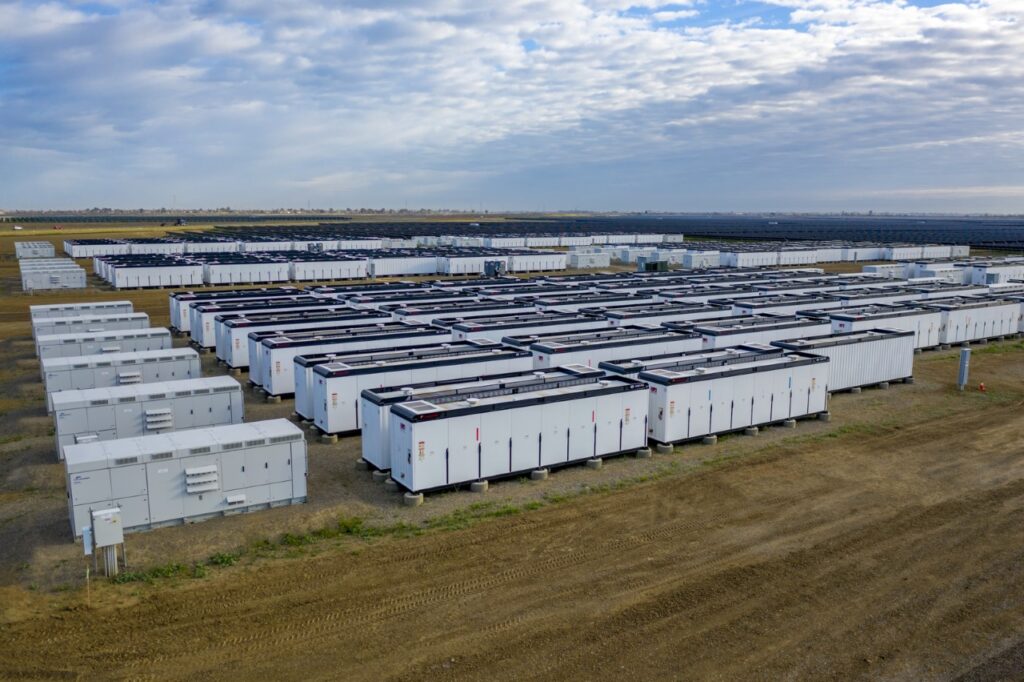Texans should understand that we – despite our reputation for gas guzzling and oil drilling – are at the leading edge of the renewables-plus-battery-storage energy market in the country. We are likely to get to energy abundance here before anywhere else does.
How do we know we are at the leading edge? A few facts.
About half of the new battery storage capacity currently being built in the US is happening in Texas. Texas has 3.5 Gigawatts (GW) of storage capacity now, with the potential for about 10 GW installed by the end of 2024, or soon after.
The Electric Reliability Council of Texas (ERCOT) manages the flow of electricity in the state and tracks certain records over time. If you’d like to feel optimistic about the energy transition and energy abundance, you can see all that data regarding these records online.
Literally in mid-July ERCOT recorded its all-time record for solar energy generation.
Also June set the record for maximum wind energy generation.
Meanwhile power storage usage hit a record in May.
Below I explain a bit about why utility-scale battery storage capacity is the key to tracking and understanding the growth and potential future impact of renewables.
Texas’ Future Electricity Market – Look to Europe
European markets are ahead of the US in terms of electricity available from utility-scale batteries, with an estimated 36 GW compared to about 15 GW total in the United States at the end of 2023.
European markets have some lessons to teach us about what may happen with pricing and availability of electricity as solar and storage get built. It’s pretty exciting, although it comes with hiccups.

One fact to know is that wholesale energy prices fluctuate throughout the day.
A second fact to know is that already-installed solar has close to zero marginal cost to generate additional power. You can’t turn off the sun, and electricity produced on bright days has to go somewhere. So producers have a need to offload electricity generated, somehow, into the grid.
Because of this need to offload power, In the middle of the day wholesale electricity prices approach zero or actually frequently turn negative, in certain markets where solar capacity has outstripped storage capacity. The number of observed “negative wholesale energy prices” days is rapidly increasing in Europe as well as in Australia.
This has been happening in Germany – the country with the most solar capacity in Europe – for a few years. It started happening in Spain in 2024. The country had prioritized solar production, but not battery storage. It actually kind of freaks them out.
A negative wholesale electricity price literally means the producer will offer electricity for free or pay to offload energy.

Energy market observers may remember the day on April 21 2020 – early COVID 19 pandemic days – when demand for fuel got so low that a refinery in Oklahoma was paying people to remove their physical oil in barrels. That’s sort of the analogy of negative electricity prices for solar. Somebody’s got to take the energy off the hands of the producer when there’s too much of it.
To be clear, extremely low or negative energy prices for solar producers are not great for the system. If you’ve built a solar plant but then spend many days of the year giving away your electricity for free – or worse, paying others to take it – that’s not good. In the long run this removes incentives to build more solar power generation and it could bankrupt producers.
In the short run, negative wholesale electricity prices are a big problem. In the long run, it’s a huge opportunity. In the long run there’s the possibility of extraordinary energy abundance.
So who might be willing to be paid to take energy, or can receive free electricity during the middle of the day? Utility-scale battery storage operators. A low or negative wholesale electricity price for battery storage operators is amazing, as long as storage providers can resell that electricity into the grid a few hours later when the sun goes down.
Currently, Spain is scrambling to invest in battery storage. Texas seems to have already figured out the future need, and the buildout is happening now.
So what happens when utilities can access very affordable energy for significant hours of the day during a significant number of days of the year? It can’t help but keep demand and therefore prices for other energy sources in check. Solar and wind plus battery storage is nowhere near sufficient yet in Texas, but rapid growth means we should see some effects soon.
When we learn about this price-arbitrage trade of battery storage operators – store free energy from the sun and sell it a few hours later at a markup – we might be tempted to object: Profiteering!
That’s probably the wrong response. Our best response is to celebrate those early profits, as they will lead to further solar and battery investment and further downward pressure on wholesale energy prices. Which eventually links to energy abundance as well as dampened consumer energy prices to keep our utility bills manageable.
“Energy transition” in 2024 has more to do with renewables making up a larger portion of the energy mix, even while both fossil fuel supply and demand continue to grow. The rapid growth of solar and battery storage is largely a move toward energy abundance and keeping prices low, more than reducing fossil fuel usage outright.
A version of this post ran in the San Antonio Express-News and Houston Chronicle
Please see related post
Solar I – Energy of the Future (and Always Will Be?)
Post read (44) times.






